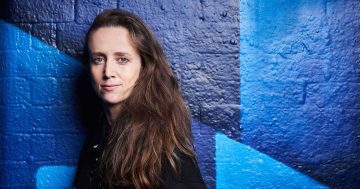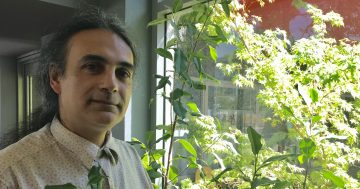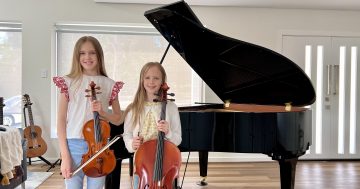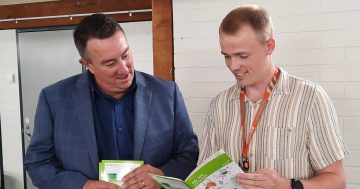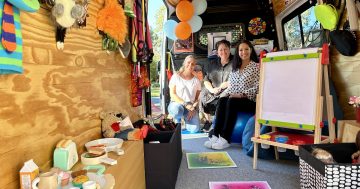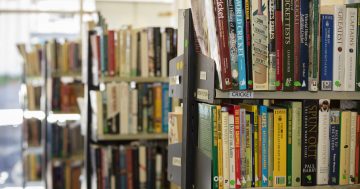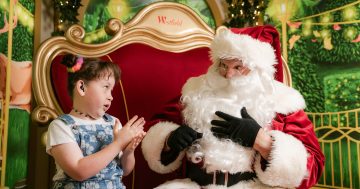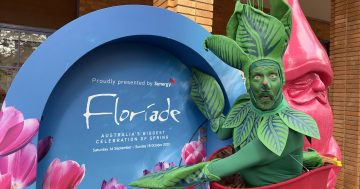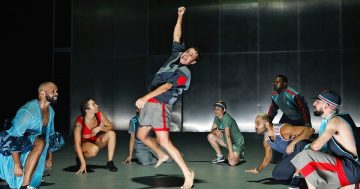
Intimate live orchestral sessions in classrooms might be a gateway to a whole new world for children with diverse abilities. Photo: CSO.
Music is said to be the universal language, and an innovative Canberra Symphony Orchestra (CSO) program aims to make that the case.
CSO’s Diverse Abilities program is an expansion of the orchestra’s previous autism support program to include children with neurological or physical differences.
The program, piloted for students in learning support units at two schools last year, has grown exponentially and will this year serve up to 10 schools including Garran Primary, Giralang Primary, Cranleigh, the Woden School and Malkara.
CSO artistic operations manager Donna Parkes, who oversees the orchestra’s community and education initiatives, says the demand indicates an access gap.
“CSO has delivered a strong suite of community outreach programs over many years and wants to focus on parts of our community that may not otherwise have access to live orchestral music,” she says.
“We held a presentation at a conference last year and had a lot of interest from teachers asking if we could come to their schools. More funding this year means we’ve been able to engage with more schools, which is fantastic.
“This expansion covers children living with hearing loss, neurodiversity and children who may simply have different learning styles to ensure that they, too, have access to the arts.”
Designed as an entry point to live orchestral music for students whose sensory and other needs preclude them from large events, the program generally sends one facilitator to the school to play recognisable music to small groups of up to five children (and as few as one). Crucially, each performance is tailored to the specific needs of the individual children in each group.
This is achieved through consultation with school faculty about formats that have proven the most successful with specific students, and by checking in and adjusting throughout the session.
Adjustments might include flexible seating arrangements, lighting and volume but also quite simply, starting in the classroom – an environment that’s familiar and comfortable.
“Kristen Sutcliffe, a long-time CSO bassoonist who has been a specialist audiologist with Hearing Australia always says ‘If you know one student with autism, you know one student with autism’,” Donna says.
“We try to avoid making assumptions about what will work for any cohort of students, and when we’re in the room we are constantly checking in and adjusting because we know that what works for one person who is neurodivergent won’t necessarily work for the next.
“We come in with a broad set of options and craft the session on the spot for the students in front of us. We use a format that’s interactive and playful, encouraging students to sing, dance and engage with the music and instruments in a way that’s fun and educational for that particular cohort.
“You never know, it might spark a lifelong love.”
Feedback has been overwhelmingly positive, with testimonials confirming high levels of engagement among students.
“The children thrived in the musical environment that you both provided and it could not have been more successful,” one testimonial read. “Thank you from the bottom of our hearts for providing us such an enriching experience. The children are still talking about you!”
The hope is that as the program grows, the CSO will be able to work with schools to incrementally modify sessions to gently transition children towards broadening their experiences, and possibly one day enjoying traditional concert settings that might otherwise overwhelm them.
This could involve students having the option of attending any combination of sessions in classrooms, school halls and even CSO rehearsals, and making allowances on real performance days such as having a separate space with headphones, the ability to watch concerts on a screen and breakout spaces where students with sensory issues can take quiet time. But it all depends on funding.
“The CSO gets some support from the government, but we rely heavily on the wonderful generosity of private donors to support our education and community programming,” Donna says.
For more information or to make a tax-deductible donation, visit the CSO.












